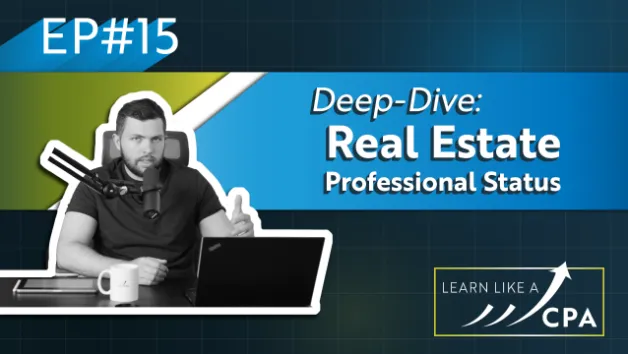Latest blogs and articles
Leading you to a better financial future.

Deep Dive: Real Estate Professional Status
Deep Dive: Real Estate Professional Status
Have you ever wondered why the real estate professional status exists? Real estate is a great way to build wealth over time. You have a stream of income, a hedge to cushion you against inflation, and there are great tax benefits such as several deductions.
Before 1986, high-earning professionals like doctors and dentists could use real estate losses to offset their income, creating a tax advantage. However, this changed with the 1986 Tax Reform Act, which introduced IRC Section 468 to limit tax shelters for real estate investors.
This Act categorized income into nonpassive (like W2 wages and stocks) and passive (like rental income) categories. While it aimed to prevent wealthy individuals from offsetting their entire income through real estate, it also affected those whose main business was real estate investment.
In response, in 1993, real estate investors pushed for the creation of the Real Estate Professional Status to address these concerns.
Benefits of the Real Estate Professional Status?
The Real Estate Professional Status (REPS) is a status given to people that work in real estate. This status gives them peculiar benefits such as converting significant passive losses like depreciation from real estate to ordinary losses, which are then deductible. This status allows them to reduce their tax liability.
With REPS, you can offset ordinary income with rental losses, which will help you generate cash flow in the form of tax savings. You can then reinvest these tax savings into your rental property or buy more properties.
If you have a real estate professional status, you also do not have to pay the net investment income tax (NIIT) of 3.8%. Coupled with the ability to reduce your tax bill from about 35% to 15% or less, REPS is a pretty useful status.
How to Qualify for REPS
You may qualify for a Real Estate Professional Status. You only need a rental property and one rental activity that you materially participate in to qualify. The requirements include:
More than half of all your participation in any business or trade during the tax year must be in real estate.
More than 750 hours of participation in real estate property businesses or trades. There are 11 types of activities that qualify for these: rental, property development, brokerage trade or business, construction, redevelopment, reconstruction, conversion, acquisition, leasing, management, and operation.
The material participation in these real estate activities must also be continuous, regular, or substantial.
As a litmus test, if you and your spouse have full-time W2 jobs, you most likely won’t qualify for REPS because you have to spend more time working in real estate than in your W2 job. To qualify while working a full-time job of an average of 40 hours weekly for 52 weekly, which makes 2080 hours annually, you’ll have to spend even more hours on real estate activities. Let’s assume this to be about 2500 hours annually. To work 4,580 hours annually, you do more than 114 hours of work weekly or more than 22 hours daily if you work only on weekdays. This is virtually impossible.
It’s also important to note that only one spouse or partner has to quality for REPS, even if it’s joint property. However, partners or spouses can’t combine their work hours to qualify for REPS.
Case Study
Imagine a taxpayer who is single, owns a real estate brokerage firm and makes $250,000 annually. He purchases a $500,000 long-term rental (LTR) property. However, the cash flow from the property is $20,000 because he purchased it in the middle of the year.
Since he already works in real estate, he qualifies as a REPS and materially participates in rental activities. He can generate $100,000 in bonus depreciation by reclassifying the personal property asset to reduce the depreciation time (cost segregation study) and another $30,037 in tax savings by being a real estate professional.
Because it’s so powerful, Real Estate Professional Status is heavily litigated in tax courts. REPS is a great way to harness the tax code, significantly reduce your tax exposure, and save enough to fuel your next investment. Once you qualify, you’ll realize how powerful it is on your journey to financial freedom and building generational wealth.
Deep Dive: Real Estate Professional Status
Join my Facebook group with over 9,000 real estate investors!

Choose Your Journey to Tax Excellence
Journey 1
Building a Tax Advisory & Consulting Practice
Scale, streamline, and systemize your advisory business.
Turn compliance clients into year-round advisory opportunities while mastering operational efficiencies for sustainable growth. This track covers pricing, hiring, marketing, and client engagement essentials to help you build a practice you love.
WHAT YOU’LL LEARN:
Crafting solid engagement letters and pricing models.
Transforming compliance clients into year-round
partners.
Marketing
strategies that drive consistent growth.
Recruiting and training the right team to scale your business.
Bonus:A Power Checklist for the ultimate year-end tax planning session.
Journey 2
Tax and Legal Foundations: Core Strategies for All Levels
Master the fundamentals that drive financial success.
Perfect for business owners and advisors, this track delivers essential insights on asset protection, tax planning, estate strategies, and IRS compliance.
WHAT YOU’LL LEARN:
Unlock estate planning with Revocable Living Trusts.
Maximize retirement savings through Solo 401(k) plans.
Real estate strategies: Short-term, long-term, and self-rentals.
Learn asset protection that actually works.
Navigate IRS resolution with confidence and ease.
Journey 3
Advanced Insights: Unlock Complex Tax Strategies
Top-tier strategies for high-value clients.
Designed for experienced professionals, this track offers in-depth guidance on prime tax strategies, entity structuring, and payroll solutions. Gain the insights needed to handle complex business scenarios with confidence.
WHAT YOU’LL LEARN:
Report multi-entity structures with Forms 1065 & 1120S.
Maximize tax savings using Bonus Depreciation & Section 179.
Seamlessly relocate clients to tax-free states.
Navigate business sales and acquisitions smoothly.
Use 105 Plans to save clients on healthcare costs.

2024 Learn Like A CPA. All rights reserved.